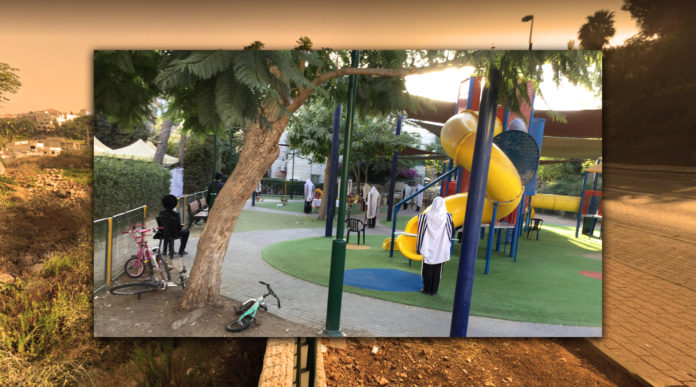
KIRYAT YEARIM, ISRAEL (JTA/CAROL UNGAR) — Lately, the media has been flooded with stories of Orthodox Jews who are derelict in following pandemic protocols. This sort of behavior runs contrary to the Torah values which command us to protect life above all else.
In my home community of Kiryat Yearim, a small haredi Orthodox town of 6,000 just 15 minutes outside of Jerusalem, we take COVID-19 seriously.
Come for a walk. You will see men, women, even small children wearing masks over their noses and mouths.
In our town, COVID-19 hit us early and hard.
Back in March, we experienced an outbreak after a Purim party attended by an overseas guest who had the virus. A few dozen residents got sick and thousands went into quarantine. No one died, but one woman, a much-beloved old timer, nearly lost her life. Thank G-d, after many months, she’s almost completely recovered. For a brief moment, our sleepy town achieved public notoriety as the COVID capital of the Jewish state.
Our local government dispatched a hazmat-suited crew to clean our streets and parks. They set up testing and contact tracing. They also embarked on a public relations drive to urge us to take this seriously.
People listened. It wasn’t long before the media hailed our triumph.
While there have been some close calls since, including several confirmed cases in the past week, my only explanation for how we have been largely able to beat back this virus when others have not is unity. Here, our rabbis, doctors and local government officials are all on the same page.
Now, the virus is back in our country with a vengeance. Like most Israelis, we are tired of living this way, but we realize that we have no choice. The Torah, which informs all areas of our existence instructs us to take great care in preserving our lives. “We err on the side of strictness,” says our Mayor Rabbi Yitzhak Ravitz.
Now we have been forced to increase our vigilance.
Even though we are in the middle of the Sukkot holiday, every synagogue in town is shuttered. Worship services have moved to parks, parking lots and backyards.
Because this is our second town-wide lockdown, the outdoor shuls are now well organized. Some of them even have names (Ginat HaBitan, or the Garden Lean-to, and Ginat Esther, Esther’s Garden). They also have erected awnings for shade. They now have Torah scrolls, borrowed from the shuttered indoor congregations, and improvised arks to store them in.
We have adapted, limiting the number of men called to the Torah in the name of social distancing. This Sukkot, our synagogues will pare down the hakafot, the ritual circling ceremony, to the bare basics, transforming the usually festive parade into a socially distanced procession of worshippers. A few congregations will skip the whole thing, having the men recite the verses that accompany the ceremony while standing still. We received a robocall informing us that on Simchat Torah, there should be no dancing and no kissing Torah scrolls. And of course, we must wear masks and keep social distance.
Simchat Torah is just a day away, and it will look very different. Plans aren’t yet complete, but one local rabbi I spoke to floated the idea of no procession, just one man carrying the Torah scroll. One thing is for sure — the traditional kiddush, the after services collective snack of cake and schnapps, is canceled.
All of this puts a damper on this holiday, which is meant to be a time of joy. With intercity visits banned due to the lockdown, not much socializing is going on for many of us. The only guests in our Sukkot are the metaphysical ushpizin, our Jewish matriarchs and patriarchs. Wondrous as that is, it doesn’t fill the longing to hug a grandchild.
Once again, our local government has stepped in, playing holiday music to lift flagging spirits. We even had a socially distanced version of the Simchat Beit Hashoavah, the nightly revelries, an integral part of this holiday.
Every night of Chol Hamoed, the intermediate days of the festival, an illuminated flatbed truck carried around a group of musicians who gave concerts in the neighborhoods of our town. There was no dancing; residents watched the show from their cars, bikes and balconies.
This is a Sukkot like no other. But who says it was terrible? Our tradition teaches that this holiday is best spent at home in the sukkah, a three-walled structure built to resemble a heavenly hug.
And our efforts to slow the spread of the virus seem to be helping. Press reports say that the number of cases in Israel is coming down.
As I write these words, a man with a recording and a loudspeaker is making his way through town. Speaking sternly, he reminds us to stick to the rules. To remain a part of the solution, not part of the problem. I hope we continue to listen.
CAROL UNGAR
is a prize winning writer who lives in the Judean Hills with her husband and sons.
As reported by Vos Iz Neias
